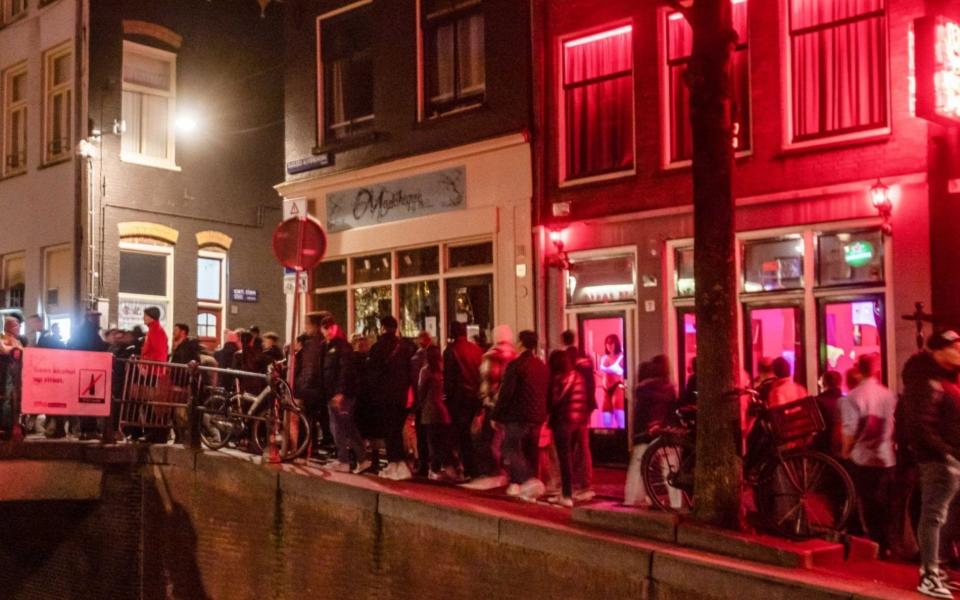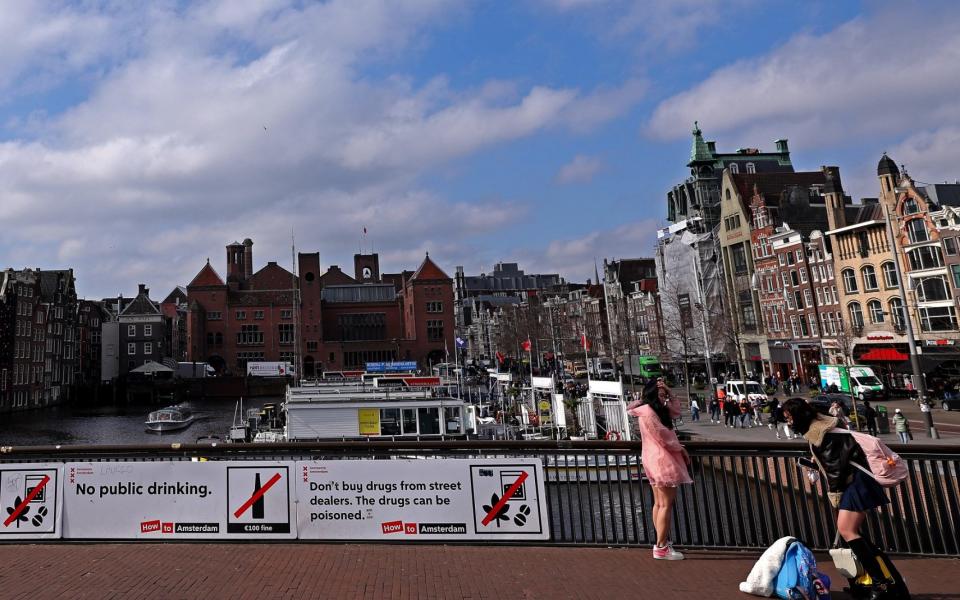The tourism authority in Amsterdam has been accused of hypocrisy and lazy stereotypes in its latest campaign to discourage British stag groups from visiting the city.
The new campaign, published on a website called “Amsterdam Rules” and currently only shown to visitors from the UK, includes a survey aimed at “discouraging a certain type of tourist from coming to Amsterdam”, according to the City of Amsterdam.
The first question is: “Why do you want to visit Amsterdam?” If you choose “Bachelor Party”, the survey reads: “This will be very troublesome, stag parties are prohibited in Amsterdam.”
When questioned by The Telegraph, a spokesperson for the City of Amsterdam explained that British hen groups were not prohibited from organizing trips to Amsterdam. Only certain sized and certain organized tours (such as pub crawls) are prohibited in certain parts of the city.
“Guided tours with more than 15 participants are not allowed. It is also forbidden to pass in front of sex workers’ windows. “The rules apply to all guided tours, including organized stag tours,” he said.
Amsterdam has imposed restrictions on British stag groups in recent years and introduced a “Keep Out” campaign in 2023. The so-called “digital discouragement campaign” involved a series of videos targeting British men aged 18 to 34, showing drunken tourists getting into trouble with the law.


Some British stag tour operators opposed the campaign. Jon Stainer, creative director at UK stag planners StagWeb, says: “We respect any destination’s right to try to discourage anti-social behaviour, but targeting hen parties specifically is a lazy stereotype.
“We ship thousands of stags to Amsterdam every year and the vast majority of them are responsible guys looking to have a good time, pumping huge amounts of money into the local economy.
“The city has the right to ‘clean up its act’, but it would be a bit hypocritical to criticize those who have capitalized on its reputation as a party mecca for years and then left.”
The latest paid campaign will target Britons who use Google search terms such as “Amsterdam coffee shop”, “Amsterdam red light district” and “Amsterdam hen party”. The €125,000 (£105,000) campaign will be shown to potential visitors from Germany, France, Italy and Spain after being rolled out to tourists in the UK.
The survey asks whether you plan to smoke pot in public (banned), sleep in your car (banned), plan to go bar hopping or take a guided tour of sex workers’ windows (no longer allowed), or plan to stay out. late nights (bars close at 2am) and whether you want to buy cocaine from a street dealer (which is illegal). If you go astray during the survey, the last page says: “What a shame… Considering your preferences, Amsterdam may not be able to offer the experience you are looking for.”
Local resident Callum Booth questions whether the survey will have any impact. “Just like the Stay Out campaign, Amsterdam’s rule testing is another ineffective way of tackling the city’s serious overtourism problem,” she says. Amsterdam Municipality says the Stay Out campaign is “not yet [had] had an overall discouraging effect on the target group choosing Amsterdam as their party destination”.


Booth adds: “No one planning to come to town for a stag do will care if such events are ‘off limits’ or even spend the time to take an online quiz to find out. Surely there are better ways to deter troublesome visitors?”
Catherine Marie, tourism brand strategist at The Plot Thickens, points out that the majority of the target group (aged 18-27) is Generation Z, which is very different from Generation Y in terms of their expectations and spending habits.
“From the 2000s to the 2010s the British drinking culture I grew up with has diminished a bit, as has the ‘Brits Abroad’ tag – it’s still there but not to the same extent,” says Marie.
“I think Amsterdam could achieve a much stronger result by appealing to this generation for a number of other reasons. [see] landscapes. Consider how cities like Berlin, Copenhagen, Split and Edinburgh achieve this. Yes, Amsterdam had a bigger challenge ahead of it, but I think there were other ways to approach it.”
Amsterdam is not alone in its search for a different kind of tourist. Lanzarote announced last year that it would launch a campaign aimed at higher-spending tourists, and Mallorca introduced rules restricting tourists’ rowdy behavior. Travel PR expert Phil Bloomfield says we can expect to see more campaigns of this type. “I believe that this and similar announcements of ‘better’ visitors by places in Spain and Turkey will become more common in the coming years,” he says.
“My view in terms of this particular campaign is that it was done with a degree of intelligence and humility on the part of the target. I think the tone is a recognition that the liberalism that made Amsterdam so popular has become an albatross around its neck, and that they now want to throw up their hands and move away – unreasonably – from the past.
“How it reaches specific groups of visitors is another matter – I can hear the anger already bubbling away – but any destination should have the right to put its residents first.”